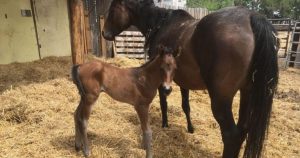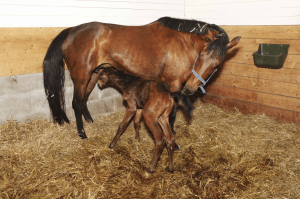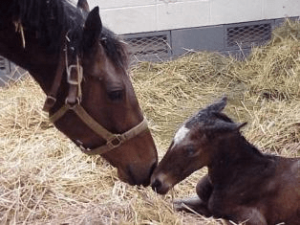Newborn Foal Care: Navigating Weather Challenges.
The initial hours of a Newborn Foal are paramount for its survival and future well-being. While most healthy newborns adapt well, severe weather conditions can pose challenges. Dr. Peter Sheerin from Rood and Riddle Equine Hospital in Lexington, Kentucky, emphasizes the significance of a foal’s ability to regulate body temperature as a major concern.

Image Credits: HEATHER SMITH THOMAS
Ideally, foals should be born in a protected environment with adequate bedding, minimal drafts, and a comfortable temperature. The use of heat lamps or foal blankets should be considered on an individual basis. However, caution is advised to ensure these measures do not hinder the foal’s natural movements or interfere with the mare-foal bond.

Foals should be nursing very soon after standing— Photo: iStock
Cold or stormy weather raises concerns about getting young foals outside for exercise. Prolonged confinement in stalls, especially in uncleaned conditions, can lead to respiratory issues and affect the foal’s skeletal development. Controlled exercise is crucial for foals born with lax tendons.
Factors like muddy paddocks, freezing temperatures, or sudden weather changes can impact the decision to turn out mares and foals. Hypothermia is a risk in extremely cold conditions, emphasizing the need for adequate shelter and monitoring, especially if a foal is born unexpectedly outdoors.

On the other end of the spectrum, hot weather poses challenges, with foals at risk of overheating and dehydration. Providing a suitable environment with fans and evening turnout can help manage the heat stress on newborns.
Rain and mud present concerns about potential infections and skin problems for foals, particularly if they are exposed to constant moisture. Balancing the need for a healthy environment with the risk of overprotection is essential.

While it’s crucial to provide a conducive environment for foals, there’s a delicate balance between protecting them from harsh conditions and allowing them to develop natural resilience. Caretakers must find a middle ground, ensuring the foals’ well-being without compromising their physical and mental development.
In conclusion, the care of newborn foals during adverse weather conditions demands thoughtful consideration and individualized approaches to ensure a healthy start in life.
Also to read: So Heartwarming: This Mare takes care of this adorable orphaned foal




